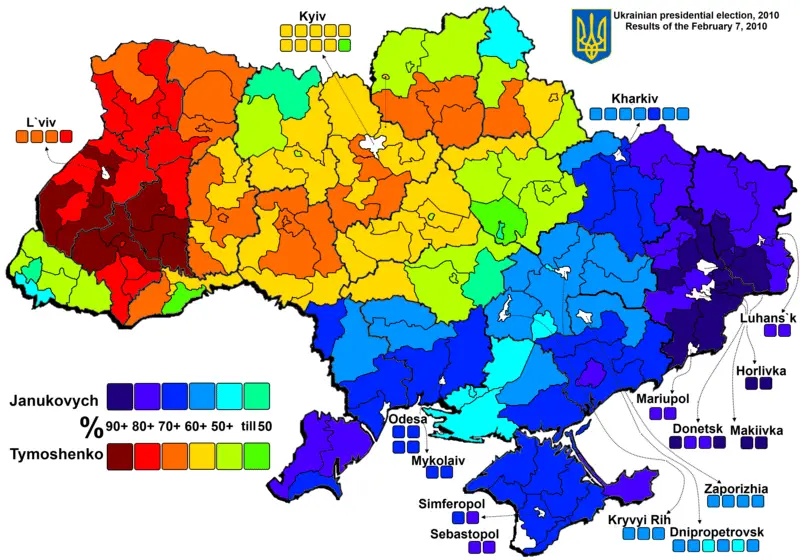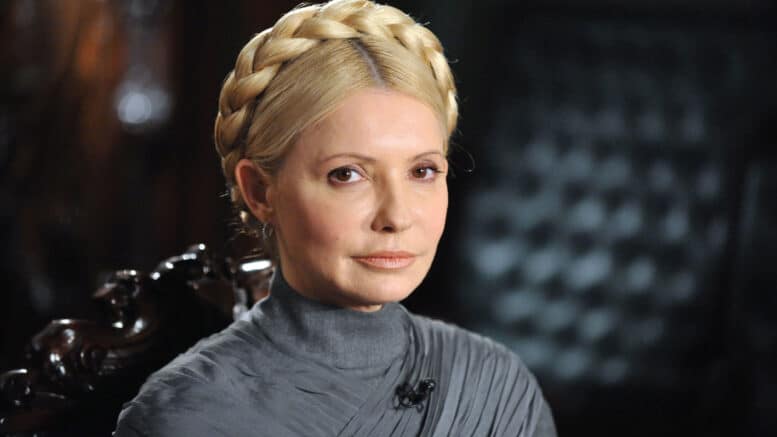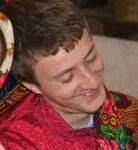A Coalition of
Populism and Nationalism
Yulia Tymoshenko is perhaps the most powerful, popular, and controversial woman in Eastern European politics. She rose to power quickly during the turbulent 1990s as a charismatic, sharp-tongued politician able to create wide political coalitions. Her party’s political platform mixes populist social programs, criticisms of capitalism and corruption, and nationalist zeal. Her coalitions, such as the Yulia Tymoshenko Bloc, have likewise mixed both left- and right-wing parties. However, as is often the case in Eastern European politics, the strength of her party and blocs has mostly depended on the strength of her personality and personal involvement. With Tymoshenko currently jailed on charges of abuse of office, her party is suffering at the polls.
Two short political platforms for her party are available from Geohistory here.

Tymoshenko first entered politics in December, 1996 when she was elected to the Verkhovna Rada as an independent. This was in a special election to replace the seat of Vasyl Durdynets, who had recently been appointed First Deputy Prime Minister. In 1997, she joined Hromada, a new social democratic party. In the 1998 parliamentary elections, the party’s first time on the ballot, Hromada won 4.7% of the national vote, with strong support in the Tymoshenko’s native Dnipropetrovsk region. Hromada earned 24 seats in the Verkhovna Rada.
Tymoshenko was selected by Hromada to chair the Rada’s large and powerful budget committee. At the time, Ukraine was steadily climbing out of a deep recession. Just three years prior, in 1995, Ukraine’s GDP had fallen 23%. By 1999, the fall had been stabilized, but the damage was deep. During her chairmanship, Tymoshenko worked on budget, tax, pension, and medical insurance reform. Pension and state salary debts were paid that been accumulated during the economic chaos that had followed the collapse of the Soviet Union.
In early 1999, Hromada founder Pavlo Lazarenko, accused of embezzlement, fled the country. Tymoshenko and others abandoned the party to distance themselves from the scandal. Tymoshenko quickly set up her own left-leaning party and faction, the All-Ukrainian Union “Fatherland” or Batkivshchyna, in July of 1999.

Former Prime Minister of Ukraine Yulia Tymoshenko on a motorcycle. Her trademark braids are a traditional Ukrainian style that she is almost never seen without.
Batkivshchyna initially supported President Kuchma’s center-right administration, despite Batkivshchyna’s leftist ideology and Kuchma’s controversies: some credited him with saving Ukraine from the worst of the economic disaster; others accused him of causing it by allowing corruption to flourish. On December 30, 1999, Tymoshenko was appointed Vice Prime Minister of Fuel and Energy in Prime Minister Viktor Yushchenko’s cabinet under Kuchma. Tymoshenko focused on anti-corruption measures during her tenure.
In January 2001, accused of corruption, Tymoshenko was dismissed as Minister. In February 2001, Tymoshenko was arrested on charges of tax evasion and smuggling gas from Russia while acting as president of United Energy Systems of Ukraine. Tymoshenko and her supporters argue the allegations were fabricated by Kuchma and oligarchs whose interests were damaged by Tymoshenko’s anti-corruption programs.
After 24 days of pre-trial detention, the charges were dropped and Tymoshenko was released. Batkivshchyna immediately joined forces with the growing Ukraine without Kuchma movement, seeking the president’s resignation.
Tymoshenko then founded the Yulia Tymoshenko Bloc, also known as BYuT, with left- and right-leaning parties: Batkivshchyna, Sobor, the Ukrainian Social Democratic Party, and the Ukrainian Republican Party. The bloc gained twenty-two Rada seats in the 2002 elections. Thirteen went to Batkivsychyna members.
In late 2002, Batkivsychyna allied with Viktor Yushchenko’s center-right party, Our Ukraine, as well as with the Communists and Socialists, to defeat President Kuchma’s supported candidate, Viktor Yanukovych, in the 2004 presidential election. As part of the coalition, Yushchenko promised to nominate Tymoshenko for Prime Minister should he win. Kuchma himself was excluded from running by constitutional term limits.
In the first round of voting, Yushchenko and Yanukovych came in first and second place respectively. Most analysts and exit polls named Yushchenko the winner of the second round. However, official results gave a +3% victory to Yanukovych. Alleging mass election fraud, Yushchenko called for public protests. Tymoshenko became a key figure in this “Orange Revolution,” giving speeches that attracted hundreds of thousands of protestors and international support from the US and EU. Ultimately, new elections were called and Yushchenko was elected with a nearly +8% lead.
Video released by Yulia Tymoshenko shortly before she was arrested on charges of corruption. Spoken in Ukrainian with English subtitles.
Tymoshenko was then confirmed as Prime Minister with the overwhelming support of 83% of Rada deputies. However, the ideological differences within the Orange Coalition soon fractured it. Yushchenko dismissed Tymoshenko from her position just months into her term.
In 2006, both Sobor and the Ukrainian Republican Party left BYuT to unite into a single party. However, power struggles in that movement led to fracturing as well and the majority of those right-wing politicians migrated back to the coalition in some form. BYuT later came second in the 2006 elections, winning 22.27% of the vote and earning 129 seats in parliament – increasing their parliamentary representation by nearly 500%.
By 2006, Tymoshenko, Batkivsychyna, and their platforms were known and appealing to many Ukrainians. Lower taxes, better pensions, a higher minimum wage, and anti-corruption programs were just a few of their populist planks. However, dissimilar to the Party of Regions, Batkivsychyna was oriented more towards Europe, and less towards Russia. Batkivsychyna also appealed to nationalists, promising to protect and support Ukrainian culture and language. Establishing Russian (spoken by nearly 20% of Ukrainians) as a second state language was opposed; they argued that enough Russians living in Ukraine understood Ukrainian and that Ukrainian needed special protection after decades of Soviet repression.
Tymoshenko and her party were also helped in the election by the fact that Yushchenko, as president, bore most of the public responsibility for the political infighting and gridlock that followed the Orange Revolution. Yushchenko’s bloc lost nearly 30% of their seats in that election. The Ukrainian political field also saw some consolidation, in part due to constitutional reforms in 2005, championed in part by Tymoshenko, which eliminated single-mandate districts and added seats to the Rada. Some smaller parties were eliminated from the Rada altogether in 2006.
Even with such gains, Tymoshenko’s party could not compete with Yanukovych’s Party of Regions, which also gained votes and retained the Rada’s largest faction – despite the recent accusations of electoral fraud. After months of political crisis, President Yushchenko called for new parliamentary elections in 2007. Tymoshenko gained another 1.5 million votes and 27 Rada seats that year. Uniting again with Yushchenko, Tymoshenko formed “Yushchenko’s Bloc,” forced Yanukovych from the Prime Minister post and was elected there in his place.
A year later, the global financial crisis hit. Ukraine’s currency, the hyrvnia, depreciated nearly 40% between 2007 and 2010, making imported products more expensive in a land whose own industry was largely dependent on aging Soviet infrastructure. Inflation doubled between 2007 and 2008; GDP declined 15% between 2008 and 2009.
Tymoshenko’s government responded with populist economic stimulus. For example, to compensate citizens who had held funds in the former Soviet Savings Bank, which collapsed with the USSR, Tymoshenko’s government paid out one thousand hryvnias each to 6.5 million depositors. Many blame Ukraine’s then-unparalleled inflation on Tymoshenko’s massive spending programs. Tymoshenko’s detractors also blamed her for failing to agree on purchase terms in 2008 for the Russian natural gas upon which industry and residential heating in Ukraine is largely dependent. In the “gas war” that followed, in one day in late December 2008, gas prices skyrocketed by 35%, straining the weakened economy even further.
Tymoshenko also supported constitutional amendments transferring more governing power from the president to parliament. Although Yushchenko had supported similar amendments in 2005, he protested the new amendments as a personal attack on himself. Tymoshenko voted with the rival Communist Party and Party of Regions to pass them. Yushchenko pulled out of the coalition, which served only to strengthen Yanukovych’s position and weaken Yushchenko’s. Tymoshenko herself believed the political posturing to be a struggle for position for the 2010 presidential election.
In June 2009, Tymoshenko announced her candidacy for that election. She was backed by Batkivshchyna and BYuT. Tymoshenko and Yanukovych were front-runners from the beginning and fought vicious campaigns: Yanukovych stressed the economic failings of Tymoshenko’s government, while Tymoshenko tried to discredit Yanukovych as a corrupt political insider.

Results of the second round of voting in the 2010 Ukrainian presidential election. Provinces voting heavily for Yanukovytch are darker blue; those voting more heavily for Tymoshenko are darker red. The country has long been split politically between the more Russian and conservative East and the more Ukrainian, European West. Graphic from Wikipedia.
In second round voting, held on February 7, 2010, Yanukovych was announced the winner with 48.95% of the vote to Tymoshenko’s 45.4%. Shortly after, the Verkhovna Rada, still dominated by Yanukovych’s party, dissolved Tymoshenko’s government. Tymoshenko and BYuT once again entered the opposition.
The prosecutor general’s office immediately opened investigations into Tymoshenko’s tenure. In June 2011, Tymoshenko was charged with abuse of office in her handling of a natural gas contract signed with Russia in 2009, during her time as Prime Minister. In October, Tymoshenko was found guilty and sentenced to seven years in prison. Her supporters, including many local Ukrainians and many governments in the EU and US, accused Yanukovych of fabricating the charges to silence his only significant political revival.
In 2011, the Rada banned blocs from participating in parliamentary elections, removing from Tymoshenko one of her favored political maneuvers. In the 2012 elections, Fatherland lost nearly two million votes and about a third of their Rada representation. Tymoshenko held multiple hunger strikes to protest alleged vote rigging.
Batkivshchyna has become an “umbrella party,” absorbing the smaller parties that once supported BYuT. In June of 2013, in an apparent act of defiance, the party nominated Tymoshenko as their candidate for president in the 2015 elections, well ahead of any other party nominations.
Yulia Tymoshenko’s daughter Yevhenia gives an interview to RFERL about her mother’s condition. Yevhenia Tymoshenko has been leading an international effort to free her mother since 2011.
Tymoshenko’s daughter has heavily lobbied the EU and US to apply pressure to the Yanukovych government, with considerable success. However, Yanukovych has indicated that he is not willing to compromise on Tymoshenko’s conviction. As of late 2013, Tymoshenko is asking to be sent to Germany for treatment for a herniated disc, but this too has been denied by Yanukovych’s government, as it is feared that she would likely seek asylum while there.
While Tymoshenko and Batkivshchyna together remain Ukraine’s second most powerful political force, both their fates remain in doubt with Tymoshenko’s continued imprisonment or possible exile.
Geopolitics offers two short platforms for Batkivshchyna here. Both are remarkably short. The first is from the party’s wildly successful 2006 parliamentary campaign. The second, more terse and defiant, is from the 2012 elections. Both have been translated by Home and Abroad Scholars at the School of Russian and Asian Studies from Russian translations of the Ukrainian original texts.




